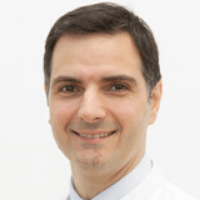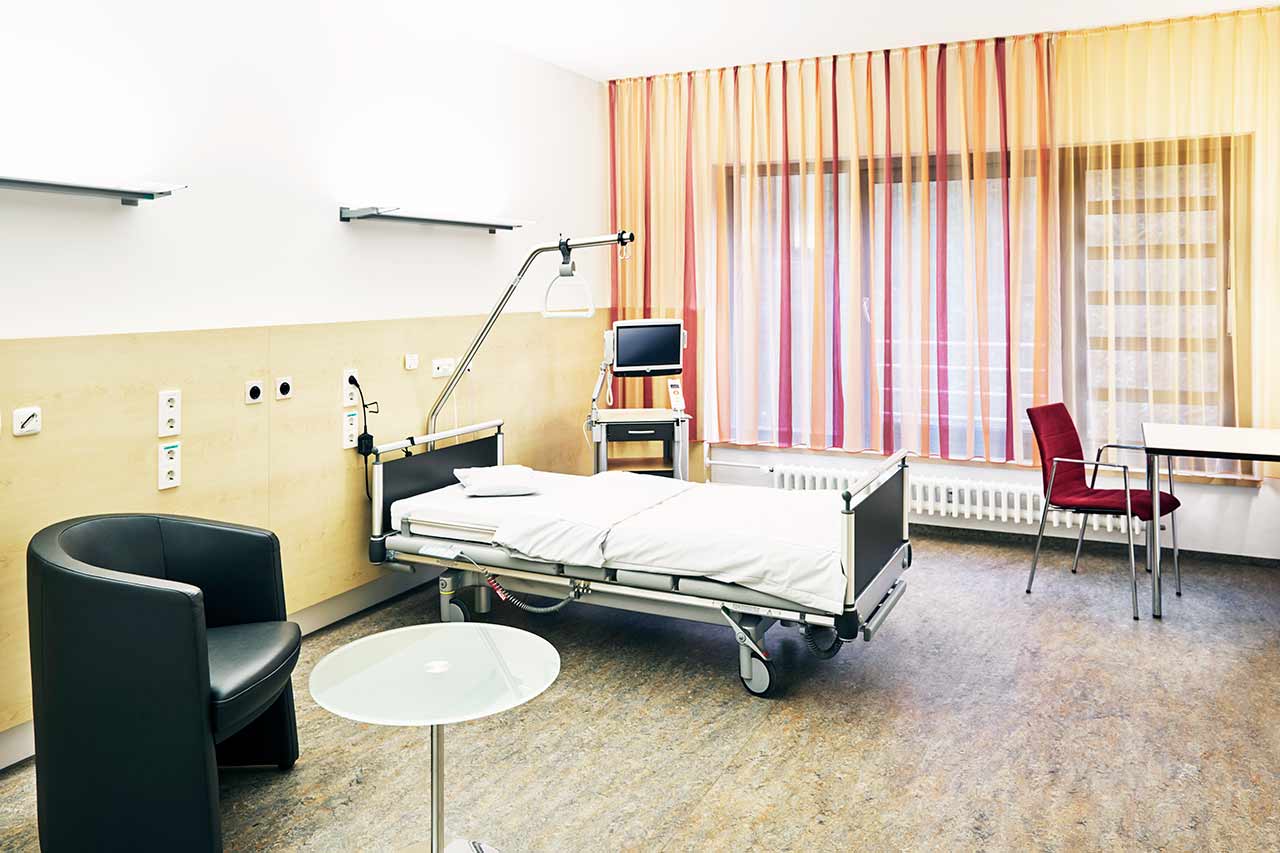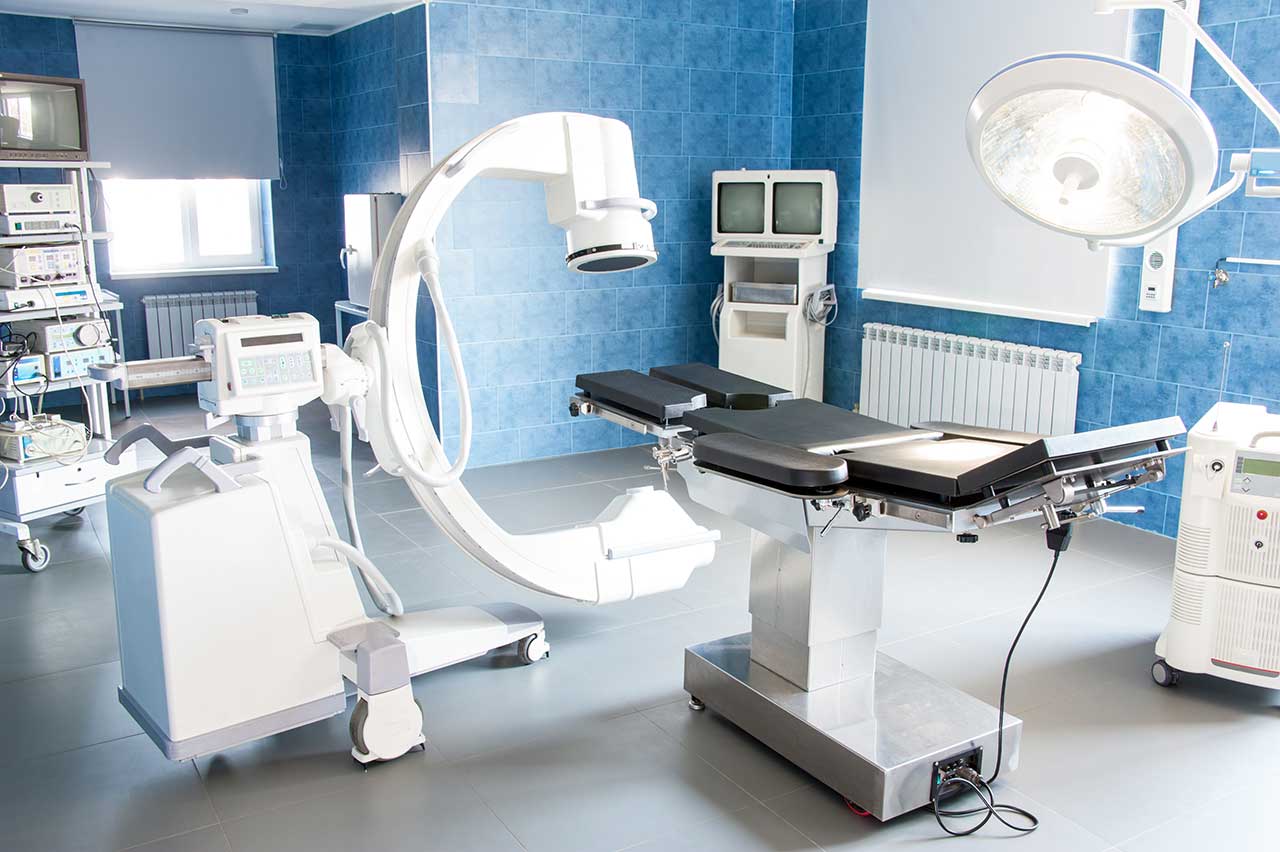
The program includes:
- Initial presentation in the clinic
- clinical history taking
- physical examination
- laboratory tests:
- complete blood count
- general urine analysis
- biochemical analysis of blood
- TSH-basal, fT3, fT4
- tumor markers
- indicators of blood coagulation
- CT scan / MRI of the abdomen
- abdominal ultrasound scan
- 1 course of chemotherapy
- nursing services
- consultations of leading experts
- explanation of individual treatment plan
How program is carried out
During the first visit, the doctor will conduct a clinical examination and go through the results of previous laboratory tests and instrumental examinations. After that, you will undergo an additional examination, including laboratory assessment of liver and kidney function, ultrasound scan. Based on the received results, the doctor will elaborate the chemotherapy regimen. If necessary, related medical specialists will be involved in the elaboration of a treatment regimen (tumor board).
Chemotherapy is carried out as the day hospital procedure, without mandatory admission to the hospital. After the placement of a venous catheter, you will stay in a comfortable ward. An infusion system will be connected to the catheter, through which the required drug or a drug combination will be administered. All drugs are administered by intravenous drip, slowly, so the total duration of the infusion can be up to several hours. All this time, doctors and nurses will monitor your health condition closely.
After the course of chemotherapy, you will stay under medical supervision in the ward for a few more hours. If your general condition is good, your doctor will allow you to leave the hospital. You will receive the medical report with detailed recommendations regarding further treatment. In the future, you will be able to have a distant consultation with your attending physician and schedule the next course of chemotherapy, if necessary.
Required documents
- Medical records
- MRI/CT scan (not older than 3 months)
- Biopsy results (if available)
Service
You may also book:
 BookingHealth Price from:
BookingHealth Price from:
About the department
As part of the Interdisciplinary Cancer Center (IOZ), the Department of Oncology and Hematology at the Marien Hospital Duesseldorf offers the full range of services in the field of diagnostics and drug treatment of malignant tumors of the internal organs, sarcomas, as well as diseases of the blood and lymphatic system (lymphomas, leukemia, etc.). Medical care is provided both on an inpatient and outpatient basis. The department has 44 beds for inpatient treatment, as well as additional 6 beds for patients who require palliative care. Each clinical case is considered by doctors at regular interdisciplinary tumor boards, which allow the specialists to develop an individual treatment regimen taking into account the patient's particular needs and achieve the desired result. In addition to first-class medical care, the focus is on interdisciplinary oncological consultations, psychological assistance and follow-up care for patients upon the completion of treatment. The Head Physician of the department is Prof. Dr. med. Aristoteles Giagounidis.
The department's oncologists have been successfully treating solid malignant tumors and sarcomas for many years. The treatment of certain types of cancer is provided in specialized centers: the Breast Center, the Bowel Cancer Center, the Prostate Cancer Center. The department also successfully deals with the treatment of oncological diseases of the gastrointestinal tract, lungs, kidneys, bladder, brain and other organs. Each case of cancer is unique and requires an individual approach, so the specialists of the medical facility develop a treatment regimen at the tumor board with the participation of doctors of the required specialties. Before starting treatment, the doctor explains the therapeutic regimen to the patient, talks about the expected results and answers the patient's questions.
The department's specialists have a wide range of therapeutic techniques for the treatment of the most complex types of cancer. In most cases, an integral part of the treatment is surgical tumor resection. However, the surgical intervention is not enough to cure cancer. Doctors also resort to various chemotherapy regimens in the form of infusions, pills, and topical agents. Targeted therapy, antihormone therapy, immunotherapy are also carried out. The department also offers palliative care for patients with advanced cancer. This type of therapy does not lead to recovery, but allows the patient to live without pain and other symptoms.
The department specializes in the treatment of the following diseases:
- Oncology
- Breast cancer
- Lung and pleural cancer (bronchial carcinoma, pleural mesothelioma)
- Esophageal cancer
- Gastrointestinal cancer (tumors of the stomach, colon, rectum)
- Pancreatic cancer
- Cancer of the female and male reproductive systems (for example, cervical, uterine, ovarian, testicular cancers)
- Kidney and urinary tract cancers (hypernephroma, bladder carcinomas)
- Bone and soft tissue tumors (bones and soft tissue sarcomas, gastrointestinal stromal tumors)
- Brain tumors
- Hematology
- Tumors of the lymphatic system (malignant lymphoma, plasmacytoma)
- Chronic leukemia
- Other diseases
The department's range of services includes the following therapeutic options:
- Drug therapy for tumors (chemotherapy)
- Intravenous chemotherapy
- Oral (in the form of pills) chemotherapy
- Local or regional chemotherapy
- Antihormone therapy (for example, for breast or prostate cancer)
- Biochemotherapy methods (the use of antibodies and enzyme inhibitors to suppress the division of tumor cells or kill them)
- Combination chemotherapy and radiation therapy for local advanced tumors of various origins
- Regional therapy
- Chemoperfusion and chemoembolization (in collaboration with the Department of Diagnostic and Interventional Radiology)
- Laser techniques
- Cryotherapy
- Palliative and supportive care (to improve the quality of life and health condition of the patient in the end-stage cancer)
- Other medical services
Curriculum vitae
University Education and Professional Career
- 1986 - 1992 Study of Human Medicine, Eberhard Karl University of Tuebingen.
- 1992 Thesis defense, Faculty of Medicine, Eberhard Karl University of Tuebingen.
- 1992 Admission to medical practice, Stuttgart Regional Council, Germany.
- 08.1992 - 02.1993 Clinical Resident, Withybush General Hospital, Haverfordwest, Wales, UK.
- 02.1993 - 08.1993 Clinical Resident, William Harvey Hospital, Ashford, Kent, England.
- 10.1993 - 10.1999 Senior Clinical Resident, Department of Oncology, Hematology and Clinical Immunology, University Hospital Duesseldorf.
- 10.1999 Board certification in Internal Medicine, Medical Association of North Rhine, Duesseldorf, Germany.
- 04.2008 Board certification in Oncology and Hematology, Medical Association of North Rhine, Duesseldorf, Germany.
- 10.1999 - 08.2012 Attending Physician, Department of Internal Medicine II, St. Johannes Hospital, Duisburg, Germany.
- 08.2008 Habilitation, Dresden University of Technology, Germany.
- Since 08.2008 Lecturer at the Dresden University of Technology, Germany.
- Since 08.2008 Member of the Aplastic Anemia and Myelodysplastic Syndrome International Foundation, Rockville, Maryland, USA.
- 06.2009 - 09.2012 Head of the Section for Clinical Research, Department of Internal Medicine II, St. Johannes Hospital, Duisburg, Germany.
- Since 09.2012 Head of the Department of Oncology and Hematology at the Marien Hospital Duesseldorf, Germany.
Photo of the doctor: (c) Marien Hospital Düsseldorf
About hospital
The Marien Hospital Duesseldorf is a modern medical facility in the very center of Duesseldorf and a recognized Research Center. The foundation stone of the hospital was laid back in 1864 with the support of the Catholic Church. The Christian principles of helping and supporting patients have not changed at all over the years, but the level of medical care has become fundamentally different: a small hospital has been transformed into a multidisciplinary medical center with 11 internal departments, institutes and 7 interdisciplinary centers. Thus, patients can receive a comprehensive diagnostic examination and treatment under one roof. The medical facility is an academic hospital, so patients have access to innovative achievements in the field of modern medicine and receive the most effective treatment.
The hospital has 437 beds for inpatient treatment. It provides first-class medical services to 63,000 patients every year. The doctors and nursing staff of the hospital strive to provide each patient with customized treatment, taking into account their wishes and needs. In addition to providing top-class medical care, the specialists pay attention to the humane attitude towards patients and their life situation. Doctors devote enough time to personal communication with patients and support them in every possible way on their path to recovery.
The team of the hospital consists of competent doctors who are the best professionals in their medical field. They all work in interdisciplinary cooperation. In their clinical practice, doctors use state-of-the-art equipment, the very latest technologies, as well as innovative treatment methods, which in combination allows achieving optimal treatment outcomes.
Photo: (с) depositphotos
Accommodation in hospital
Patients rooms
The patients of the Marien Hospital Duesseldorf live in comfortable patient rooms equipped with everything necessary. The room furnishing includes a comfortable bed with an orthopedic mattress, a bedside table, a wardrobe, a table, chairs, and a TV. The rooms are designed in light colors so that patients feel comfortable here. Each patient room also has an ensuite bathroom with shower and toilet.
Meals and Menus
The patients of the hospital are offered a healthy and balanced three meals a day: buffet breakfast, lunch and dinner. The menu also includes dietary and vegetarian dishes.
If for some reason you do not eat all the foods, you will be offered an individual menu. Please inform the medical staff about your food preferences prior to treatment.
Further details
Standard rooms include:
Religion
Religious services are available upon request.
Accompanying person
Your accompanying person may stay with you in your patient room or at the hotel of your choice during the inpatient program.
Hotel
You may stay at the hotel of your choice during the outpatient program. Our managers will support you for selecting the best option.





